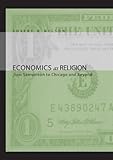と物理学者でありコラムニストであるマーク・ブキャナンがブルームバーグコラムで問い掛けている(H/T Economist's View、Mostly Economics)。
以下はその冒頭部。
Is economics a science or a religion? Its practitioners like to think of it as akin to the former. The blind faith with which many do so suggests it has become too much like the latter, with potentially dire consequences for the real people the discipline is intended to help.
The idea of economics as religion harks back to at least 2001, when economist Robert Nelson published a book on the subject. Nelson argued that the policy advice economists draw from their theories is never “value-neutral” but foists their values, dressed up to look like objective science, on the rest of us.
Take, for example, free trade. In judging its desirability, economists weigh projected costs and benefits, an approach that superficially seems objective. Yet economists decide what enters the analysis and what gets ignored. Such things as savings in wages or transport lend themselves easily to measurement in monetary terms, while others, such as the social disruption of a community, do not. The mathematical calculations give the analysis a scientific wrapping, even when the content is just an expression of values.
Similar biases influence policy considerations on everything from labour laws to climate change. As Nelson put it, “the priesthood of a modern secular religion of economic progress” has pushed a narrow vision of economic “efficiency,” wholly undeterred by a history of disastrous outcomes.
(拙訳)
経済学は科学なのだろうか、それとも宗教なのだろうか? 経済学を専門とする者は、経済学は科学に近いと考えたがる。しかし、多くの者がそのことを盲信していることは、経済学がむしろ宗教に近付き過ぎていることを示唆しており、その結果、経済学がそもそも手を差し伸べようとしている市井の人々に災禍がもたらされる可能性がある。
宗教としての経済学という概念は少なくとも2001年まで遡ることができる。その時に経済学者ロバート・ネルソンがそれを主題とした本*1を出版した。ネルソンは、経済学者が自らの理論から導き出す政策提言は決して「価値中立的」ではなく、他の人々に対しては客観的な科学の装いを凝らしつつも彼らの価値観が盛り込まれている、と論じた。
自由貿易を例に取ろう。自由貿易が望ましいという判断において経済学者は、予測された費用と便益を比較衡量する。その手法は表面的には客観的に見える。しかし、分析において何を採用し何を無視するかは経済学者が決めている。賃金の貯蓄分や輸送といった項目は金額での測定が容易であるが、共同体の社会的混乱といった項目はそうではない。数学的な計算は分析に科学的な装いを与える。たとえ中身が価値観の表明に過ぎない場合であっても。
同様のバイアスは、労働法から温暖化に至るまであらゆる政策検討に潜んでいる。ネルソンの言葉を借りれば、「経済進歩という現代の世俗宗教の司祭たち」は経済的「効率性」という狭い視野を推し進め、悲惨な結果の積み重ねに動じることもまったくない。
この後ブキャナンは(エドワード・ラジアーらの進めた)経済学帝国主義が2008年の金融危機で勢いを失った、と論じ、そもそも合理性は人間の生活においてアノマリーなのだ、と断じている。
また、善良な意図の下に進められた経済介入が価値判断(例:政治的反動の軽視)によって損なわれてしまう、という点を論じた論文として、アセモグル=ロビンソンの「Economics versus Politics: Pitfalls of Policy Advice」を挙げ、そこから以下の2つの例を引用している。
- 過去数十年に亘って米国をはじめとする西側各国で労働組合が弱体化したことは、経済学者によれば良いことであった。というのは、組合の賃金に関する独占力が、企業が市場の需要への対応能力を損なってきたと考えられるためである。しかし、アセモグル=ロビンソンは、組合が労働の供給や費用に影響を及ぼす以上の役割を果たしてきたことを指摘する。具体的には民主主義の創造と支持、企業の政治力への制約、所得格差の縮小である。
- 1990年代のロシアでの産業の民営化の推進は、どのような経緯で実現しようとも私有財産制は最終的には経済全体にとって良いこと、という考えに基づいていた。しかし実際には、不正が入り込んだ民営化のプロセスがオリガルヒの台頭と格差拡大を招き、それがプーチンの専制体制につながった。
最後にブキャナンは、経済学の限界を弁えていた経済学者としてネルソンが挙げたフランク・ナイトに言及し、経済学は彼の姿勢に立ち返るべし、と論じている。
*1: Economics As Religion: From Samuelson to Chicago and Beyond Economics As Religion: From Samuelson to Chicago and Beyond
